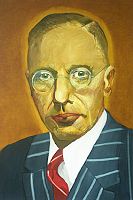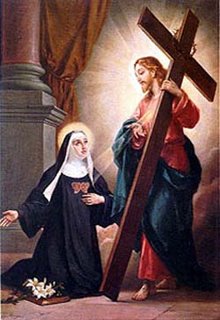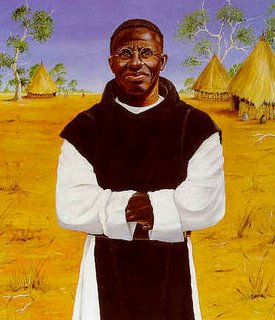
The life of Nikolaus Gross epitomises, the virtues of family life through the example he not only left his children but what he teaches us to this day. In order to provide for his family he not only met their physical needs but also helped in developing their character in going against the trend if that trend is evil. For as a father Nikolaus wished to be able to leave a legacy where good does overcome evil and the vanquished will become the victors, but also that life itself need not be a hellish experience.
Though Nikolaus was born in the 19th century in his homeland of Germany, his life was spent trying to improve the working conditions of the lower to middle class citizens of Germany. In this effort he joined the Christian Miner's Union and in 1919 he also joined the St. Anthony Miners Trade Union, perhaps Nikolaus recognised from the beginning that one of the sins that cry out to Heaven is to give a man his rightful wage. To fight for the rights of the honourable working labourer does not make one a 'communist' but it does ennoble the workers rights in the eyes of God, Nikolaus Gross understood this perfectly.
At the young age of 22 years he worked on the paper 'The Miner' as assistant editor this work took him all over Germany and it was in Essen that Nikolaus decided to settle down and it was here that he married his wife, Elizabeth Koch. This loving couple were to be blessed with 7 children, even though Nikolaus did not let up in his efforts to provide better conditions for the working man, he didnt neglect his duties as a loving husband or a loving father of which he was both. Indeed both Nikolaus and Elizabeth instilled into all their children a deep devotion to the Catholic Church and filial obedience to God and also a love for the poor and sick.
It was in 1927 that Nikolaus became editor in chief of the West German Workers Newspaper an affiliate of the St. Anthony Miners Association. It was also during this period that Nikolaus understood that though a man must be given his rightful wage and better working conditions still this was not enough to make one truly happy, as this could only be achieved through faith based principles. During all his activities Nikolaus found strong support in his wife, Elizabeth as both provided a stable and faithfilled family life.
What set Nikolaus apart from many others was his understanding and grasp of the threat that National Socialism could wreak on the German people, he recognised the inherent evil within the Nazi philosophy. Where others at first embraced the Nazi's Nikolaus sounded a cautious note as he discerned the implications of a dictatorial state run by a group of fascists with no leanings towards God or respect towards man. Indeed in one of his editorials Nikolaus Gross wrote this towards those who wished to embrace this new philosophy, "As Catholic workers we reject Nazism not only for political and economic reasons, but decisively also, resolutely and clearly, on account of our religious and cultural attitude".
This earned a reprimand once the Nazi's gained power and set Nikolaus on a course of a non compromising position so though Nikolaus worded his editorials differently the message maintained its integrity to the truth. This did not appease the Minister for Labour Roberty Ley who had the paper banned. It was here that the conviction grew within Nikolaus heart that he could not be a bystander when such evil presented itself in the form of the Nazi party.
Both Nikolaus and Elizabeth knew that one cannot afford apathy if they wished to provide a wholesome future for their children. Nikolaus made the decision to join the underground resistance within Germany a very dangerous activity indeed! At the heart of all that moved this heroic man was his love of God and Church and he knew that to live on his knees was not the course that God would choose for him, rather he would stand his ground and fight this evil threat not only to the German people but to the whole world.
For above all things Nikolaus followed God and did not seek to appease man at the price of his principles. This decision must have proved very difficult for both Elizabeth and Nikolaus as they sought to protect their children, but not at all costs for what is a world devoid of love and ruled by brute force!
During this time, though no great writer or orator Nikolaus Gross wrote two pieces which condemned the Nazi regime, unfortunately these two written pieces fell into the hands of the dreaded Gestapo. From this time on Nikolaus's days were numbered as he and his family endured interrogations and house searches, through this terror the Gross family held strong in full knowledge that at times Principles must come before safety.
The courage shown by Nikolaus Gross was truly admirable as he faced down the Nazi terror without flinching. There were many who admired this man of great strength of character and principle including Priests and Monsignors as Monsignor Schulte said to Nikolaus, "Mr. Gross, remember that you have seven children. I have no family for which I am responsible. It's a matter of your life'. To which Gross made a really great statement to me: "If we do not risk our life today, how do we then want one day to justify ourselves before God and our people?'' Though Nikolaus displayed true heroic virtue still he was not a superman and at times what lay ahead of him if he continued terrified him but it did not paralyse him as he overcame his fear and lived on principle alone, he did this not only for himself but for the future of his wife and children.
After the assassination of Hitler Nikolaus Gross was thought to be a member of those that had planned this, but the Nazi intelligence was wrong for though Nikolaus opposed Hitler and all that he stood for he did not take part in the assassination plot. This did not stop the Nazi's arresting this difficult and outspoken nuisance so in 1944 Nikolaus was arrested and sent to the notorious concentration camp of Ravensbruck, where he suffered deprivation and torture before being transferred to a penitentiary in Berlin, where the torture continued as evidence of this was seen by his beloved and devoted wife Elizabeth.
Through this difficult period Nikolaus courage and determination in the face of death was admired by all he met. What gave Nikolaus such courage to face what seemed an inevitable death and a torturous one at that? The key to Nikolaus Gross was his strong prayer life which he had maintained throughout and the knowledge that what he was going through had a greater meaning than the mere temporal. During this time his wife and children prayed with fervour for the safety of their father but more importantly that God would strengthen him for the ordeals that lay ahead of this great man. One's heart goes out to Elizabeth and their children as they knew what their father was doing was right but still they loved him and wanted him home, but God had other plans. Through the prayers of his family and friends Nikolaus embraced his death as one meeting his great love, his Heavenly Father. Till the end Nikolaus displayed no fear.
Nikolaus Gross was executed in 1945.
Blessed Nikolaus Gross was beatified in 2001 by Pope John Paul II.
Some Quotes.
"that one must obey God more than men". "If something is demanded of us that goes against God or the Faith, then not only may we, but we must, refuse obedience (towards men)"
"If we do not risk our life today, how do we then want one day to justify ourselves before God and our people?'"
"Sometimes, my heart becomes heavy and the task appears insoluble if I measure my own human imperfection and inadequacy against the greatness of the obligation and the weight of the responsibility. If a generation must pay the highest price, death, for its short life, we look for the answer in ourselves in vain. We find it only in Him in whose hand we are safe in life and in death. We never know what problems are waiting to test the power and strength of our souls.... Man's ways lie in obscurity. But even darkness is not without light. Hope and faith, which always hasten ahead of us, already have a presentiment of the breaking of a new dawn. If we know that the best thing in us, the soul, is immortal, then we also know that we shall meet each other again".
Peace of Christ to ALL
Copyright © 2006 Marie Smith. All rights reserved.
Roman Catholic
Catholic Saints

